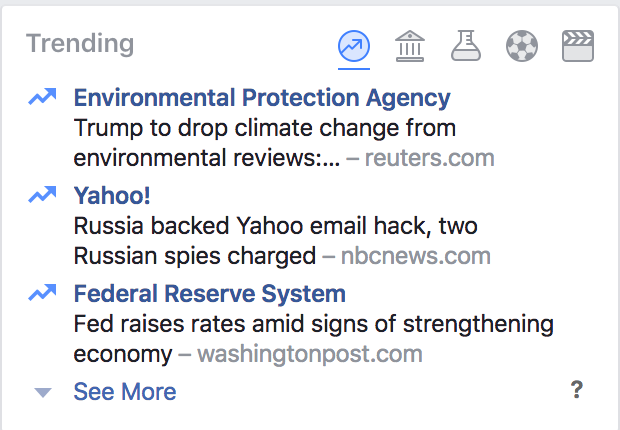Facebook adds disputed tag for untruthful articles
Facebook displays a selection of news articles. Facebook introduced a tag last week for disputed articles in order to combat the spread of fake news.
March 15, 2017
Facebook implemented a tag last week which marks articles as disputed by third party fact checkers after controversy surrounding the spread of fake news on its website.
According to Facebook, the third party fact-checkers include PolitiFact, Snopes and the Associated Press, but Facebook withheld its exact selection process for fact-checkers. Facebook has stated that fact-checkers need to follow Poynter’s code of principles for fact-verification, a set of rules for fact verification compiled by the Poynter Institute, a nonprofit journalism school based in St. Petersburg, Florida.
The list include principles such as a commitment to nonpartisanship, fairness, transparency of sources and honest corrections.
The disputed news tag is a continuation of Facebook’s fight to improve news content on its site. In December of last year, Facebook made reporting an article easier, and in January this year, it added new factors into its priority ranking system, such as whether a page asked for likes or posted spam.
“It’s definitely a step in the right direction,” Kevin Xu (11), a regular Facebook user, said. “I’m not sure about the practicalities of the program though. The third-party websites could be politically motivated or maybe fake news articles will go unreported.”
CEO Mark Zuckerberg first mentioned the idea of third party verification in a post uploaded on Facebook in November. The company previously relied on user submitted reports and the manual fact-checking of posts by employees to recognize and penalize fake news articles by lowering their priority on news feeds. Though user reports are still the driving force behind third party verification, reported posts can now be publically tagged as questionable instead of just appearing less on feeds.
Users can click on the flagged posts to see explanations on why a third party fact-checker questioned the veracity of an article.
“Not many people have a Facebook account, so there is no point having it,” Mahi Kolla (9) said. “When I do get a Facebook account, knowing that those articles are flagged is assuring as fake news wouldn’t be able to change my perception of the world.”
Accused in May of last year of altering its news feed algorithm to censor conservative outlets, Facebook automated its news feed in an attempt to remove human bias.
In an announcement in November of last year, Facebook said that it will try to improve the quality of related articles in its new feeds and continue to listen to journalists and others in the news industry to combat fake news.


















![“[Building nerf blasters] became this outlet of creativity for me that hasn't been matched by anything else. The process [of] making a build complete to your desire is such a painstakingly difficult process, but I've had to learn from [the skills needed from] soldering to proper painting. There's so many different options for everything, if you think about it, it exists. The best part is [that] if it doesn't exist, you can build it yourself," Ishaan Parate said.](https://harkeraquila.com/wp-content/uploads/2022/08/DSC_8149-900x604.jpg)




![“When I came into high school, I was ready to be a follower. But DECA was a game changer for me. It helped me overcome my fear of public speaking, and it's played such a major role in who I've become today. To be able to successfully lead a chapter of 150 students, an officer team and be one of the upperclassmen I once really admired is something I'm [really] proud of,” Anvitha Tummala ('21) said.](https://harkeraquila.com/wp-content/uploads/2021/07/Screen-Shot-2021-07-25-at-9.50.05-AM-900x594.png)







![“I think getting up in the morning and having a sense of purpose [is exciting]. I think without a certain amount of drive, life is kind of obsolete and mundane, and I think having that every single day is what makes each day unique and kind of makes life exciting,” Neymika Jain (12) said.](https://harkeraquila.com/wp-content/uploads/2017/06/Screen-Shot-2017-06-03-at-4.54.16-PM.png)








![“My slogan is ‘slow feet, don’t eat, and I’m hungry.’ You need to run fast to get where you are–you aren't going to get those championships if you aren't fast,” Angel Cervantes (12) said. “I want to do well in school on my tests and in track and win championships for my team. I live by that, [and] I can do that anywhere: in the classroom or on the field.”](https://harkeraquila.com/wp-content/uploads/2018/06/DSC5146-900x601.jpg)
![“[Volleyball has] taught me how to fall correctly, and another thing it taught is that you don’t have to be the best at something to be good at it. If you just hit the ball in a smart way, then it still scores points and you’re good at it. You could be a background player and still make a much bigger impact on the team than you would think,” Anya Gert (’20) said.](https://harkeraquila.com/wp-content/uploads/2020/06/AnnaGert_JinTuan_HoHPhotoEdited-600x900.jpeg)

![“I'm not nearly there yet, but [my confidence has] definitely been getting better since I was pretty shy and timid coming into Harker my freshman year. I know that there's a lot of people that are really confident in what they do, and I really admire them. Everyone's so driven and that has really pushed me to kind of try to find my own place in high school and be more confident,” Alyssa Huang (’20) said.](https://harkeraquila.com/wp-content/uploads/2020/06/AlyssaHuang_EmilyChen_HoHPhoto-900x749.jpeg)






